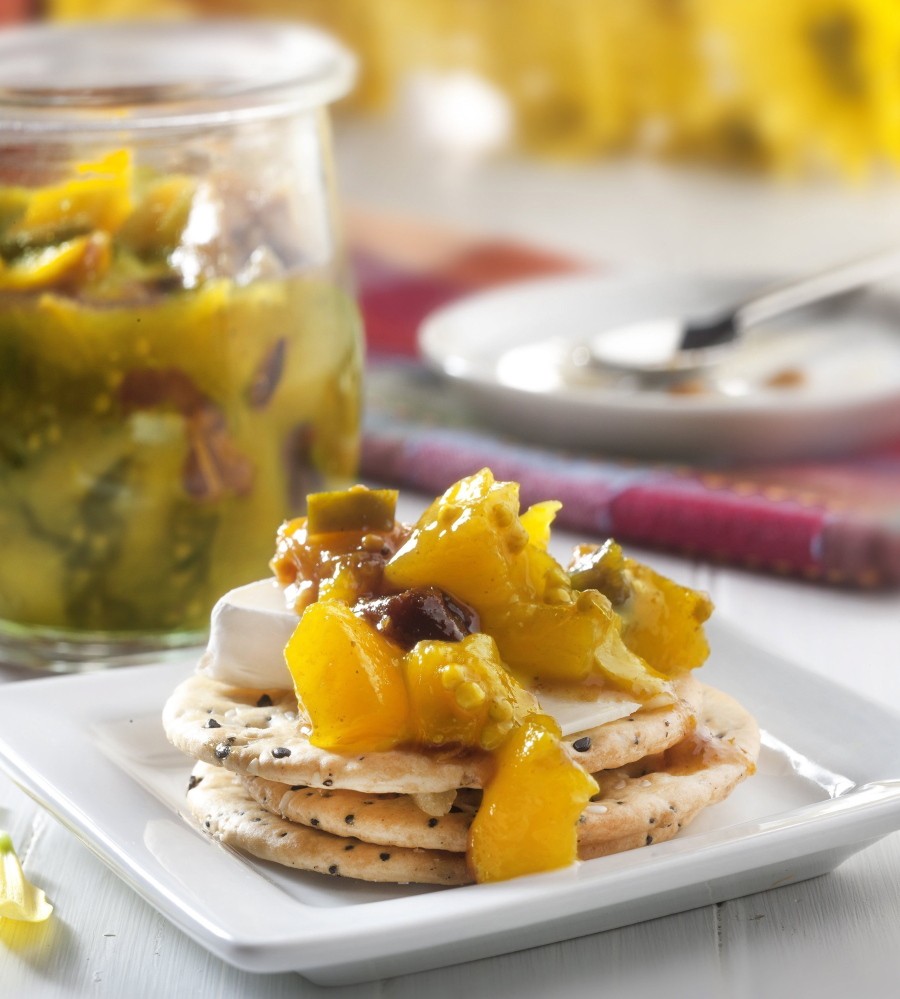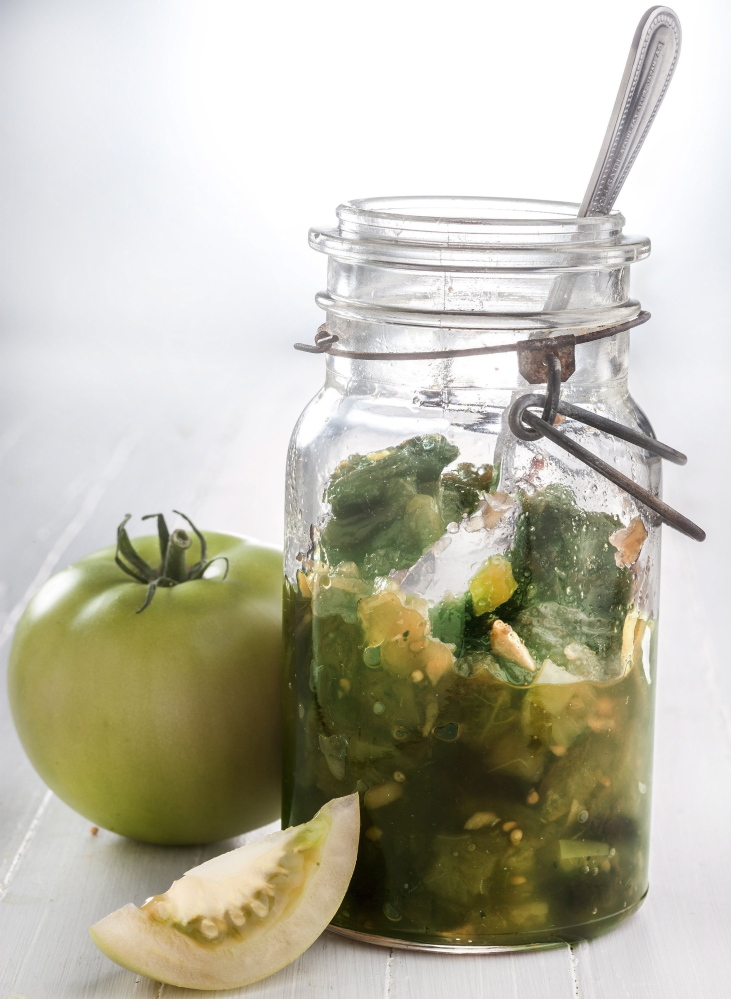It’s time to spice up your pantry.
OK, so you don’t have a pantry like your granny’s, one where she stored glistening jars of jams, jellies and pickles made with goodies from her garden. Maybe you don’t even have a garden. That shouldn’t prevent you from preserving summer’s flavors.
Nor should a tradition of making berry jams and crock dill pickles stop you from stirring up a batch of chutney, a versatile preserve that can add a range of flavors – sweet, spicy, tangy, tart – to recipes.
“Chutney is a versatile condiment with many uses besides playing sidekick to curried dishes,” writes Leda Meredith in her new book, “Preserving Everything.” Making her point, Meredith suggests using chutney in grilled cheese sandwiches, pureeing it with a bit of water to make a glaze for roasting meats and mixing it with cream cheese for a dip.
Chutney (or chatni, as it’s also known) sprang from the creativity of Indian cooks, who serve it with curries, rice and lentil dishes in flavors ranging from mint to mango.
The condiment traveled to England, where cooks upped its sweet factor and put their own spin on the ingredients. You may find chutneys incorporating beets, caramelized onions and ale (though not all together).
Among chutney recipes in Theodora FitzGibbon’s “The Art of British Cooking,” one uses dates and bananas; another, cranberries. An integral part of that cheese-meat-and-bread pub meal called a ploughman’s lunch, chutney also pairs well with duck pate or roasted game.
It has fans in South Africa and in this country. Kevin West notes in his book, “Saving the Season,” that chutney “spread across the Atlantic to the West Indies and the American South, where the esteemed mango was replaced by the honorable peach.”
Cookbook author Monica Bhide suggests in her book “Modern Spice” that “there really are no rules when it comes to making chutney.” Yet she offers these tips:
• Use the freshest ingredients possible, particularly for raw chutneys.
• Have all ingredients ready before you begin, especially for cooked chutneys.
• Pay attention to cooked chutneys; they can easily burn.
• Use nonreactive pans (stainless steel or glass); some metals can react with the acid in the chutney.
• A raw chutney can be consumed immediately after it’s made. Or in the case of a cooked chutney, we found the flavor mellowed substantially even a day after cooking. No matter which chutney you choose, enjoy its versatility.
PEACH CHUTNEY
Prep: 15 minutes
Cook: 1 hour
Makes: 4 pints
Adapted from Kevin West’s “Saving the Season” (Alfred A. Knopf, $35). Nectarines can be used instead of peaches.
5 pounds peaches or nectarines, peeled, cut into 1/2-inch cubes
3 cups organic or turbinado sugar
2 cups apple cider vinegar
3/4 cup raisins
1 cup chopped Vidalia onion
1 sweet banana pepper or half a yellow bell pepper, diced
2 or 3 fresh green jalapeños, minced or to taste
2 cloves garlic, minced
2 tablespoons fresh grated ginger
2 teaspoons fresh grated turmeric or 1/2 teaspoon ground
1/4 cup mustard seeds
1 teaspoon garam masala
2 teaspoons Darjeeling tea leaves
1. Combine all ingredients in a deep pot. Heat to a boil. Lower heat to a simmer; reduce for as long as 1 hour or until excess liquid boils away and what remains is thick and jamlike. Taste chutney at several points during cooking and adjust seasoning. Chutney should be deeply flavored and complex with a bit of spicy heat. If you like the bright taste of green chiles, add more minced jalapeños during the last 10 minutes of cooking.
2. Ladle hot chutney into 4 prepared pint jars. Leave 1/4-inch headspace, and process in a boiling-water bath for 10 minutes. (Best if allowed to cure for a month before eating.) Or store in covered jars in the refrigerator.
GREEN TOMATO CHUTNEY
Prep: 10 minutes
Cook: 20 minutes
Makes: 3 pints
Adapted from Leda Meredith’s “Preserving Everything” (Countryman Press, $19.95). Meredith suggests using this as a master recipe, “swapping pears or peaches for the green tomatoes” if you wish.
6 cups finely chopped green tomatoes
1 large tart apple, peeled, cored, finely chopped
2 cups light brown sugar
2 cups apple cider vinegar
11/2 cups raisins, chopped
1 organic lemon, sliced into thin slivers (include peels, discard seeds)
1/4 cup minced fresh ginger
1 clove garlic, peeled, minced
1 to 2 chile peppers, minced
1/2 teaspoon salt
1/4 teaspoon each ground allspice, ground coriander seeds
Pinch of ground cloves
Place all ingredients in a large saucepan over medium-high heat. Boil, stirring often, until green tomatoes and apple are very soft. The chutney is thick enough when a wooden spoon dragged across the bottom leaves a trail that doesn’t fill in with chutney until a couple of seconds have passed. Keeps in refrigerator up to 1 month.
MINT-CILANTRO CHUTNEY
Prep: 5 minutes
Chill: 30 minutes
Makes: 1 cup
This classic chutney is “one of the most popular in India,” writes Monica Bhide in her book “Modern Spice: Inspired Indian Flavors for the Contemporary Kitchen.” “Make small portions since they don’t last.” She notes that her father mixes it with yogurt to serve with lamb kebabs; her mom adds pomegranate seeds and serves it with grilled fish.
1 cup each, packed: cilantro leaves, mint leaves
1 green serrano chile, optional
1/4 small red onion, peeled, sliced
1 tablespoon dried pomegranate seeds, optional
2 tablespoons fresh lemon juice
1/2 teaspoon salt
Up to 2 tablespoons water
Blend all ingredients except water in a blender to a smooth paste. Add up to 2 tablespoons water if needed. Taste; add more salt if needed.
Transfer to a covered container; chill about 30 minutes. Serve cool.
Refrigerate up to 4 days.
Send questions/comments to the editors.




Success. Please wait for the page to reload. If the page does not reload within 5 seconds, please refresh the page.
Enter your email and password to access comments.
Hi, to comment on stories you must . This profile is in addition to your subscription and website login.
Already have a commenting profile? .
Invalid username/password.
Please check your email to confirm and complete your registration.
Only subscribers are eligible to post comments. Please subscribe or login first for digital access. Here’s why.
Use the form below to reset your password. When you've submitted your account email, we will send an email with a reset code.